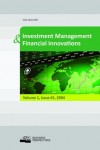The relationship between the Nasdaq Composite Index and energy futures markets
The relationship between the Nasdaq Composite Index and energy futures markets
Author(s): Ikhlaas GurribSubject(s): Economy, Energy and Environmental Studies, Transformation Period (1990 - 2010), Present Times (2010 - today), Financial Markets
Published by: ТОВ “Консалтингово-видавнича компанія “Ділові перспективи”
Keywords: Nasdaq Composite Index; energy futures markets; equity market;
Summary/Abstract: This paper sheds light on the relationship between the Nasdaq Composite Index and a newly proposed Energy Futures Conditions Index (EFCI). While various financial conditions indices provide information about the financial stability of a country, the existence of an energy condition index, using futures markets, is scarce. Using weekly data over the period 1992–2017, this paper introduces an energy futures index using principal component analysis and test its predictability over the Nasdaq Composite Index. The EFCI captures 95% of the variability inherent in crude oil, heating oil and natural gas futures’ total reportable positions. Stability in forecast errors over different lags suggests a one week lag is sufficient to forecast weekly Nasdaq Composite Index. 95% prediction levels support that the estimated model captures actual equity market index values, except for the 2000 technology bubble. Distributions of level data were non-normal, not serially correlated and homoscedastic under the whole sample period, with diagnostics on pre and post technology bubble crisis showing mixed results. While differencing ensured homoscedastic errors in the forecasting model, Granger causality supported non-causality from both energy futures and equity markets, suggesting no evidence of cross market information flows.
Journal: Investment Management and Financial Innovations
- Issue Year: 15/2018
- Issue No: 4
- Page Range: 1-16
- Page Count: 16
- Language: English

